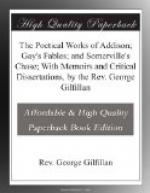When Orpheus tuned his lyre with pleasing
woe,
Rivers forgot to run, and winds to blow,
While listening forests covered as he
played,
The soft musician in a moving shade.
That this night’s strains the same
success may find,
The force of magic is to music joined;
Where sounding strings and artful voices
fail,
The charming rod and muttered spells prevail.
Let sage Urganda wave the circling wand
On barren mountains, or a waste of sand,
10
The desert smiles; the woods begin to
grow,
The birds to warble, and the springs to
flow.
The same dull sights
in the same landscape mixed,
Scenes of still life, and points for ever
fixed,
A tedious pleasure on the mind bestow,
And pall the sense with one continued
show;
But as our two magicians try their skill,
The vision varies, though the place stands
still,
While the same spot its gaudy form renews,
Shifting the prospect to a thousand views.
20
Thus (without unity of place transgressed)
The enchanter turns the critic to a jest.
But howsoe’er,
to please your wandering eyes,
Bright objects disappear and brighter
rise:
There’s none can make amends for
lost delight,
While from that circle we divert your
sight.
PROLOGUE TO SMITH’S[10] PHAEDRA AND HIPPOLITUS.
SPOKEN BY MR WILKS.
Long has a race of heroes fill’d
the stage,
That rant by note, and through the gamut
rage;
In songs and airs express their martial
fire,
Combat in trills, and in a fugue expire:
While, lull’d by sound, and undisturb’d
by wit,
Calm and serene you indolently sit,
And, from the dull fatigue of thinking
free,
Hear the facetious fiddle’s repartee:
Our home-spun authors must forsake the
field,
And Shakspeare to the soft Scarletti yield.
10
To your new taste the
poet of this day
Was by a friend advised to form his play.
Had Valentini, musically coy,
Shunn’d Phaedra’s arms, and
scorn’d the proffer’d joy,
It had not moved your wonder to have seen
An eunuch fly from an enamour’d
queen:
How would it please, should she in English
speak,
And could Hippolitus reply in Greek!
But he, a stranger to your modish way,
By your old rules must stand or fall to-day,
20
And hopes you will your foreign taste
command,
To bear, for once, with what you understand.
HORACE.-ODE III., BOOK III.
Augustus had a design to rebuild Troy, and make it the metropolis of the Roman empire, having closeted several senators on the project: Horace is supposed to have written the following Ode on this occasion.




